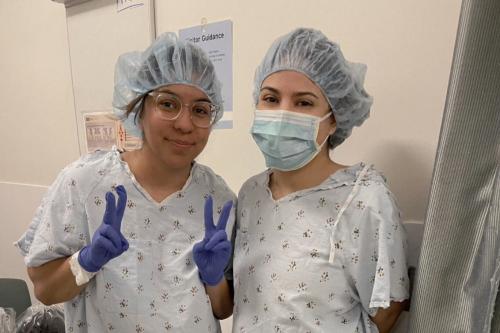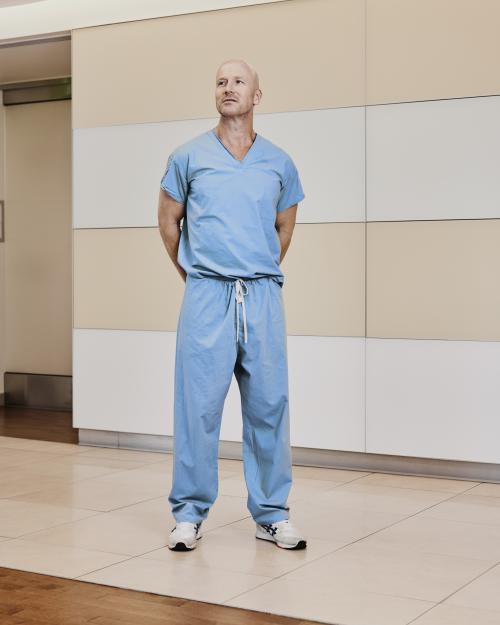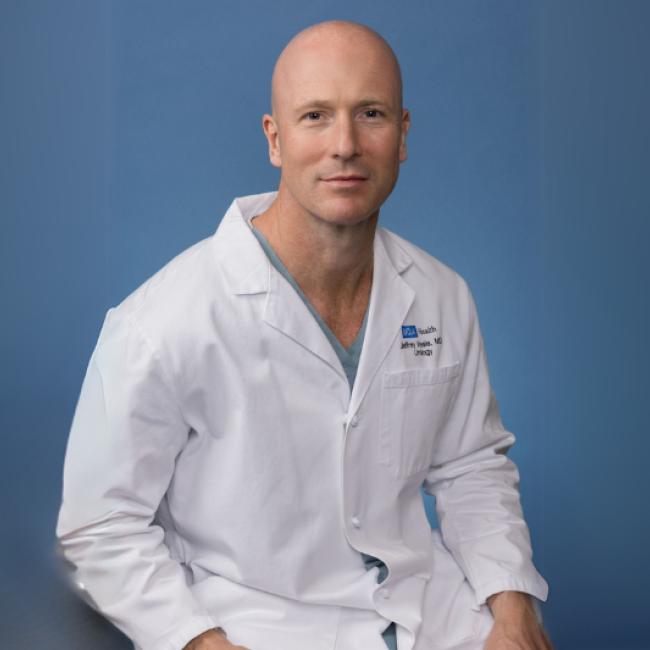
Game changer for kidney transplant patients: UCLA clinical trial could eliminate need for lifelong immunosuppressive drugs
Key Takeaways
- A $6.7 million grant from the California Institute for Regenerative Medicine will support UCLA’s clinical trial of a stem cell-based therapy that aims to help kidney transplant patients safely stop taking lifelong immunosuppressive drugs.
- The therapy uses donor-derived blood stem cells to retrain the recipient’s immune system, helping it accept the transplanted kidney without rejection and improving long-term organ survival.
- The grant also supports research that could expand UCLA’s delayed tolerance protocol beyond well-matched sibling pairs to mismatched pairs.
When Karina Ledesma’s kidneys failed in high school, she was told she’d need a transplant — and a lifetime of immunosuppressive drugs to keep it working. But thanks to an experimental UCLA clinical trial, she’s now living with a kidney donated by her sister and no longer needs daily medications to protect it.
“It was such a relief to finally throw all the drugs away,” said Ledesma, 26. “I didn’t need to keep them here. I didn’t need to see them every day as a reminder. Tossing them all out was just a really great feeling.”
For nearly a year after her transplant, and before enrolling in the trial, Ledesma experienced troubling side effects from the immunosuppressive medications — insomnia, burning sensations in her fingers and toes and the constant need to plan her day around taking pills at 8 a.m. and 8 p.m.
Now she’s finally free from those burdens. Ledesma has been off her medications for just over a month, and her sister Rosa Rivera, 28, who donated the kidney, supported her through every step of the journey.
More patients may soon have the same opportunity. UCLA’s Dr. Jeffrey Veale has received a $6.7 million grant from the California Institute for Regenerative Medicine to expand the clinical trial that helped Ledesma.
His study explores delayed immune tolerance, which involves infusing donor-derived blood stem cells months or even years after a kidney transplant to retrain the recipient’s immune system with the aim of eliminating the need for lifelong immunosuppressive drugs currently required to prevent organ rejection.
Veale and his team have already demonstrated early success with this approach focusing solely on patients with a close-sibling match who had their transplant within the last five years. Starting in January 2026, the clinical trial will open to patients who have had kidney transplants up to 20 years ago.
Veale’s method works like this: After infusion, the donor stem cells integrate into the recipient’s bone marrow and immune system, creating a mixed population of donor and recipient immune cells — a state known as chimerism. This helps the recipient’s immune system recognize the transplanted kidney as “self,” reducing the risk of rejection and eliminating the need for ongoing immunosuppressive medications.
Of the six patients treated in the phase 1/2 trial to date, three are completely off immunosuppressive drugs, and the others are on a lower dose or successfully tapering.

“This could be the difference between managing end-stage renal disease as a chronic condition and actually curing it,” said Veale, professor of urology at the David Geffen School of Medicine at UCLA and a member of the UCLA Broad Stem Cell Research Center. “A kidney transplant takes recipients most of the way there, but patients say being able to get off immunosuppressive drugs feels like truly being cured.”
Expanding the trial
The new grant will fund the enrollment of 10 additional patients in the trial and support research into the science behind immune tolerance, helping Veale and his team identify the biological mechanisms that make tolerance possible and uncover biomarkers that could predict which patients are most likely to benefit.
The clinical trial is currently only open to patients who have received a kidney donation from a well-matched sibling. Veale hopes that by understanding how tolerance occurs, he and others can pinpoint ways to make it possible in a broader range of donor-recipient types — and in more kinds of organ transplant cases.
“Right now, only a select group of patients qualify for this therapy,” said Veale, who is also director of the UCLA Kidney Exchange Program. “But if we can understand why tolerance works at the cellular level, we may be able to offer it to patients with less well-matched donors — or even extend it to liver and other transplants. That’s what makes this research so exciting. It’s not just about improving outcomes — it’s about unlocking immune tolerance for many more patients.”
Freeing more patients from the burden of immune suppression
Immunosuppressive medications, while essential for transplant success, come with serious — and sometimes life-threatening — side effects including infections, cardiovascular disease, diabetes and cancer. Ironically, they can also cause damage to the very organ they’re meant to protect.
“These immunosuppressive drugs have not changed in decades,” Veale said. “They’re expensive, impair the recipient’s quality of life and decrease graft survival. Once patients start taking them, it’s just a matter of time until they’ll need another transplant.”
Approximately half of all kidney transplants fail within 15 years and many of the 90,000 people currently waiting for a kidney in the U.S. are heading for their second, third or fourth transplant.
Delayed tolerance could help turn the tide. Unlike earlier protocols that required simultaneous kidney and stem cell transplants, Veale’s method opens up immune tolerance for patients who received a kidney transplant years ago.
This not only makes it possible to treat patients who received their kidney transplant elsewhere but also enables the stem cell infusion to take place on an outpatient basis, without placing strain on hospital beds and resources.
Importantly, the delayed protocol opens the door for tolerance beyond kidney transplant, where the recipient can recover from their major surgery prior to receiving conditioning treatment and donor stem cell infusion.
“The beauty of doing it in a delayed fashion is that it takes all the pressure off the hospital,” said Veale. “The transplant has already occurred, whether it was done at UCLA or in another part of the world. Now the patient just comes in for an outpatient conditioning regimen and stem cell infusion. They get their treatment in the morning and are out and about in the afternoon. That’s what makes it so scalable.”
Understanding why tolerance works
Still, more research is needed to fully understand why delayed tolerance works and which patients are most likely to benefit.
Veale’s team will use the CIRM funding to analyze blood and tissue samples from trial participants to look for clues: changes in immune cell populations, cytokine profiles or signs of donor cells persisting in the organ itself. These insights could help researchers predict who will respond best to the protocol and guide the design of future trials involving mismatched pairs.
“With this funding, we can find out why tolerance works. We really don’t fully understand the immunology behind it,” Veale said. “For example, we’ve seen patients lose all signs of donor stem cells over time and yet remain tolerant and off their medications. That tells us something deeper is happening — maybe the donor stem cells re-educate the recipient’s immune system and leave a footprint we can’t yet detect. This grant gives us a chance to finally study what’s going on and learn how to replicate it in more patients.”
Ultimately, Veale hopes the research will help shift the transplant field’s focus from preserving organ function to preventing long-term harm — not just keeping donated kidneys working, but keeping recipients healthy and medication-free.
For more information about the clinical trial of the delayed immunosuppression-free kidney transplant protocol for well-matched siblings, please visit the program website, call (310) 267-7727 or email ImmuneToleranceProgram@mednet.ucla.edu.
